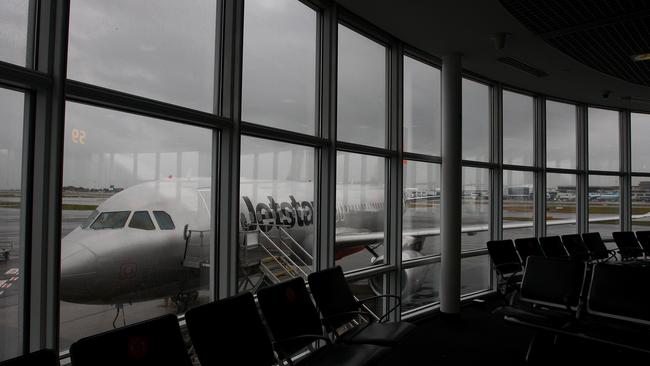Airport demands clearer rules after loss, $2bn raising
Sydney Airport chief takes aim at absence of clear rules around travel restrictions after a $53.6m loss in the first half of 2020.

Sydney Airport chief executive Geoff Culbert has taken aim at the “absence of clear rules” around COVID-related travel restrictions as he announced a $53.6m loss for the first six months of 2020, and a $2bn equity raising.
The loss represented a 400 per cent decline on the previous corresponding period, and reflected the catastrophic downturn in passengers through Australia’s biggest gateway due to domestic and international border closures.
In the first three months of the year 9 million passengers passed through the airport, but that figure fell to just 400,000 in the second quarter, down 97 per cent on the same time last year.
Mr Culbert said the COVID crisis had put other shocks such as the September 11 terrorist attacks and SARS outbreak “in the shade”, resulting in the greatest restrictions to overseas travel since World War II.
“The domestic (travel) restrictions are the greatest since our history of federation,” Mr Culbert said.
The lack of passengers going through the airport had meant sharp income losses in every area of operation, with aeronautical revenue plunging 58 per cent and carparking revenue down 51 per cent in the first half of the year.
Retail revenue took a 44 per cent hit with the airport providing rental relief for many tenants. As a result only three retailers had taken the decision to vacate Sydney Airport. Mr Culbert said a COVID vaccine and rapid breath or blood test for travellers seemed like the only way aviation could return to pre-pandemic levels but that was likely to be some time off.
“I think what we need (from governments) is a clear plan. We need to know what the rules are, we need to know what the triggers are for border closures and reopenings and we need to map out a pathway to recovery that includes various scenarios,” said Mr Culbert.
“What we have at the moment is an absence of clear rules, clear triggers for border closures. We have inconsistency across the states and that’s creating a huge amount of confusion for everyone.”
The $2bn equity raising through a renounceable entitlement offer was designed to strengthen the airport’s balance sheet, and ensure it remained well capitalised to meet the challenges of the COVID-19 environment.
Moody’s Investors Service vice-president Nicholas Chapman said the equity raising underscored Sydney Airport’s commitment to a stable capital structure.
“While the raising will reduce the near-term credit pressure, key drivers of Sydney’s credit profile include the removal of government restrictions on cross-border people movement and a restoration of people’s confidence to fly,” Mr Chapman said.
“Such factors depend on effective control of the coronavirus and consequently remain highly uncertain.”
A note by S&P Global Ratings said the airport’s equity raising reduced the risk of a rating downgrade.
“However the COVID-19 outbreak continues to curb passenger movement at the airport,” said the note.
“If state borders, especially Victoria and Queensland open soon, domestic capacity could ramp up, as indicated in New Zealand. Still, the opening of international borders is harder to predict, creating uncertainty on the return of high-value-yielding international passengers.”
In addition to the capital raising, Sydney Airport was set to undertake a major restructure of its own operations with job losses likely among the 500 workers.
To date, $5m of the JobKeeper allowance had been paid to airport staff but Mr Culbert said it was not reasonable to expect those payments to continue indefinitely.
“We have to make decisions,” he said. “It would be disingenuous of us to take payments for jobs that may not exist in the future.”
Throughout Australia, airports were estimated to be losing $300m a month, resulting in Canberra Airport now closing on Saturdays and Darwin Airport reducing its hours of operation from 24/7 to 5am to 9pm.
Mr Culbert said early on in the pandemic he had given the federal government a commitment Sydney Airport would remain open as an “essential service”.
“There are essential flights, there are repatriation flights, there is freight going out and we can’t have that activity stopped,” he said.
“We’ll continue to look at ways to reduce the losses but one thing that we won’t do is completely shut.”
Australian Airports Association chief executive James Goodwin said the federal government needed to provide direct support to airports.
“We need a funding commitment from the government to cover the costs of essential, government-mandated services such as international and domestic security screening, airfield security and extra cleaning,” Mr Goodwin said.
Since January 24, Sydney Airport shares have fallen from $8.43 to a low of $4.70. Trading was halted at $5.39 ahead of Tuesday’s raising.








To join the conversation, please log in. Don't have an account? Register
Join the conversation, you are commenting as Logout